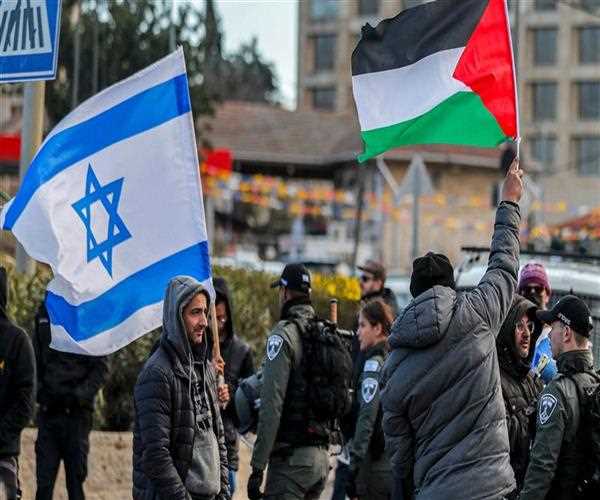
13-Apr-2023
Know the root cause of the Israeli-Palestinian conflict
The Israeli-Palestinian conflict is a long-standing conflict that has been ongoing for decades, with both sides holding strong and deeply entrenched positions. The conflict has caused immense suffering and has taken a heavy toll on both Israeli and Palestinian communities. Understanding the root causes of this conflict is crucial to finding a lasting and just solution.
Israel's Arab neighbors announced a plan to militarily destroy the state in April and May 1967.
Egypt would come in from the West, Jordan from the East, Syria from the Northeast over the Golan Heights, and various terrorist organizations that had been attacking Israeli settlements from Lebanon.
It is extremely serious because it is occurring simultaneously on multiple fronts: Cross-border fighting between Israel and Palestinian armed groups in Gaza, marches from Jordan on the West Bank border, and violence in Israel's mixed cities – towns with a significant number of Jewish and Palestinian citizens – are all examples of Israeli police actions against Palestinians protesting home evictions or praying at the Al-Aqsa mosque in Jerusalem. Together, these conflicts are well on their way to becoming one of the worst spasms in the Israeli-Palestinian conflict's recent history.
Several Arab countries in the region contributed troops, aircraft and logistical support.
An Arab "final solution" was planned. The announced strategy was to eliminate Israel as a state, and it would be unfortunate for the Jews to get in the way. Plans were made for how the invaders would divide the tiny pieces of territory over which they were fighting as tanks and troops approached the borders.
In what came to be known as the Six Day War, the Israelis redrew the map of the Middle East, capturing the Golan Heights, the West Bank, the Gaza Strip along the Mediterranean, the entire Sinai Peninsula to the Suez Canal, and the entire city of Jerusalem. the latter, which the Arab rulers had periodically barred their access to.
The Arabs' largely Soviet-supplied military was humiliated by a small nation that had no outside troops and destroyed numerous tanks, planes, trucks, and other equipment.
Since then, the Israelis have given back some of the lands they took in exchange for peaceful relations: Sinai and the Gaza strip.
Useful background because people often forget how the two sides got to where they are today.
Israel and the Palestinians are at war in light of the fact that the Palestinians actually need what they couldn't get in 1967: the demise of Israel's nation-state.
Here are some of the main causes of the Israeli-Palestinian conflict:
Historical Disputes
The Israeli-Palestinian conflict has its roots in a long history of disputes over land ownership and sovereignty. Both Israelis and Palestinians claim the land of Israel/Palestine as their ancestral homeland, and both have strong religious and cultural ties to the region.
Zionism and Palestinian Nationalism
Zionism is a political ideology that supports the establishment of a Jewish state in the land of Israel. The Zionist movement emerged in the late 19th century, and led to the
creation of Israel in 1948. This movement, however, has been seen as a threat to Palestinian national identity, as it resulted in the displacement of hundreds of thousands of Palestinians from their homes.
Occupation and Settlements
Since the 1967 Six-Day War, Israel has occupied the West Bank and Gaza Strip, territories that were previously under Jordanian and Egyptian control. Israel has also established settlements in these territories, which are considered illegal under international law. The presence of these settlements has led to conflict and tension between Israeli settlers and Palestinian residents.
Jerusalem
Jerusalem is a holy city for Jews, Christians, and Muslims, and it has been a source of contention in the Israeli-Palestinian conflict. Both Israelis and Palestinians claim Jerusalem as their capital, and the city has been a focal point of conflict and violence.
Security Concerns
Israelis have long been concerned about security threats from Palestinian militant groups such as Hamas and
Islamic Jihad. These groups have launched attacks against Israeli civilians and military targets, causing significant loss of life and property damage. Israel has responded with military force, including airstrikes, ground incursions, and targeted assassinations.
Lack of Trust
Perhaps one of the biggest obstacles to resolving the Israeli-Palestinian conflict is the deep mistrust that exists between the two sides. Years of violence, displacement, and political deadlock have eroded any sense of trust or goodwill between Israelis and Palestinians, making it difficult to negotiate a lasting peace agreement.
In conclusion, the Israeli-Palestinian conflict is a complex and multi-faceted conflict that has its roots in a long history of disputes over land ownership, sovereignty, and national identity. The conflict is fueled by factors such as occupation and settlements, security concerns, and a lack of trust between the two sides. Resolving this conflict will require a willingness on the part of both Israelis and Palestinians to make difficult compromises and work towards a just and lasting peace agreement.

SEO and Content Writer
I am Drishan vig. I used to write blogs, articles, and stories in a way that entices the audience. I assure you that consistency, style, and tone must be met while writing the content. Working with the clients like bfc, varthana, ITC hotels, indusind, mumpa, mollydolly etc. has made me realized that writing content is not enough but doing seo is the first thing for it.
Join Our Newsletter
Subscribe to our newsletter to receive emails about new views posts, releases and updates.
Copyright 2010 - 2026 MindStick Software Pvt. Ltd. All Rights Reserved Privacy Policy | Terms & Conditions | Cookie Policy